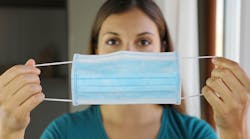One of the factors for business owners who are making the decision of whether to reopen while the COVID-19 pandemic waxes and wanes is the prospect of legal liability claims filed by employees, vendors and customers who contract the virus in your premises. This is an issue that policymakers in a number of states are seeking to address through laws and edicts.
On the federal level there isn’t much to report because partisan differences have reinforced legislative gridlock. Senate Bill No. 4317—which if adopted as written would institute a federal COVID-19 liability shield similar to those that exist at the state level—is still on hold. Senate Republicans have taken the position that a liability shield should be a pre-condition for additional COVID-19 relief, while Democrats thus far have opposed creating this kind of federal shield.
States that have already jumped on the bandwagon are Alabama, Arkansas, Georgia, Idaho, Iowa, Kansas, Louisiana, Michigan, Mississippi, Nevada, North Carolina, Ohio, Oklahoma, Tennessee, Utah and Wyoming. Each has chosen to enact COVID liability shields either by taking legislative action or through executive orders issued by their governors.
Legislation is being considered in several other states, including Alabama, Arizona, Delaware, Illinois, Minnesota, New Jersey, New York and South Carolina, report attorneys Honore Hishamunda and Kevin M. Young of the Seyfarth Shaw law firm. “While not a complete cure for pandemic-related litigation, these shields should help to manage the pain presented by a wave of COVID-19 litigation that is likely to continue for years to come,” they observe.
In general, these laws are intended to protect businesses (as well as their employees) from civil lawsuits related to actual or potential exposure to COVID. The lawyers make a point of warning that these laws are not designed to shield business owners from willful, reckless, intentional or grossly negligent misconduct; and they do not prevent employees from filing workers’ compensation claims stemming from their workplace exposure to the virus.
Although each state’s liability shield differs in a variety of ways, so far they generally have shared certain features:
• They protect businesses (as well as their employees) from civil suits related to actual or potential exposure to COVID-19.
• They do not protect willful, reckless, intentional or grossly negligent misconduct.
• They do not prevent employees from filing workers’ comp claims related to actual or potential workplace exposure to COVID-19.
However, the state laws vary considerably beyond those common characteristics. “Most important, the shields differ in substantive scope—for example, which businesses they apply to, what types of actions or omissions they protect—as well as temporal scope,” Hishamunda and Young note. “Idaho, for example, has established concrete beginning and expiration dates for its liability shield law, while the law in Tennessee lacks a beginning date and the law in Utah lacks an expiration date.”
How State Laws Vary
These laws also differ with respect to the exact types of protections they create. The attorneys point out that among the protective features that some—but not all—state liability shield laws include are:
Bar on filing. Some state shields, such as Tennessee’s, prohibit would-be plaintiffs from filing a COVID-19 lawsuit at all unless their complaint contains a statement from a physician stating that their injuries were caused by the business named in the lawsuit.
Heightened proof. Some states, such as Nevada, require a plaintiff to make a showing to the judge that a business defendant did not follow public health guidance in order to proceed to trial.
Interaction with public health guidance. In some jurisdictions, such as Arkansas and Iowa, a business’s good faith effort to comply with public health guidance is recognized as a defense to liability in a COVID-19-related lawsuit. In other states, for example Michigan and Mississippi, a failure to substantially comply with public health guidance may preclude a business from gaining the benefit of the state’s COVID-19 liability shield.
Posting protection. In some states like North Carolina, a business receives an added layer of protection if it can demonstrate that it complied with certain posting requirements, such as a required posting concerning its risk mitigation procedures.
Assumption of the risk. In Georgia, businesses that post a COVID-19 risk notice using language provided by state statute, whether at their entrances or on tickets or receipts provided to those who enter the premises, are entitled to a rebuttable presumption of assumption of the risk by a plaintiff who is attempting to assert a COVID-19-related claim.
Limitation on damages. In Alabama, plaintiffs are limited with respect to the damages they might seek when the shield’s civil immunity does not apply.
States keep moving ahead with proposing new laws. On Nov. 13, during a special legislative session, Missouri lawmakers introduced a bill that would provide a civil liability shield for businesses, emergency supply and equipment product makers and health care providers in connection with coronavirus-related injury and wrongful death suits.
As of Dec. 2, the Coronavirus had killed 4,185 people in Missouri.
The Missouri bill would provide a liability shield for businesses that make, distribute or donate products in direct response to the current health emergency, as well as businesses, schools and churches from suits related to COVID-19 exposure or infections.
The bill also would shield premises owners from lawsuits so long as they can show that they substantially complied with federal, state and local health regulations and unless the person bringing the lawsuit can prove that the owner sought to intentionally harm the person bringing suit, or acted with a deliberate and flagrant disregard for the safety of others.
In addition, as currently written, the legislation spells out that caregivers are protected from lawsuits that stem directly from COVID-19 -related treatment, but also when suit pertains to the delivery or nondelivery of health care during Missouri's health emergency.
The legislation is supported by Republican Gov. Michael Parson, who asked the Republican-controlled General Assembly to pass it during the special session he recently called to deal with state budget matters. If enacted, the bill would be retroactive to March 13, the day the state health emergency was declared in Missouri and will continue as long as the emergency order remains in effect.
Even with all these state liability shield protections and limitations on litigation, as a general matter, businesses will still face lawsuits related to potential or actual COVID-19 exposure, warn Hishamunda and Young. However, they say, “businesses will not be liable for claims involving ordinary negligence; and they may be able to use additional tools to contain liability, such as procedural prerequisites for plaintiffs filing suit, their own good faith efforts to comply with public health guidance, and compliance with statutory posting laws.”

